9th Symposium on Advanced Legal Topics in Land Conservation
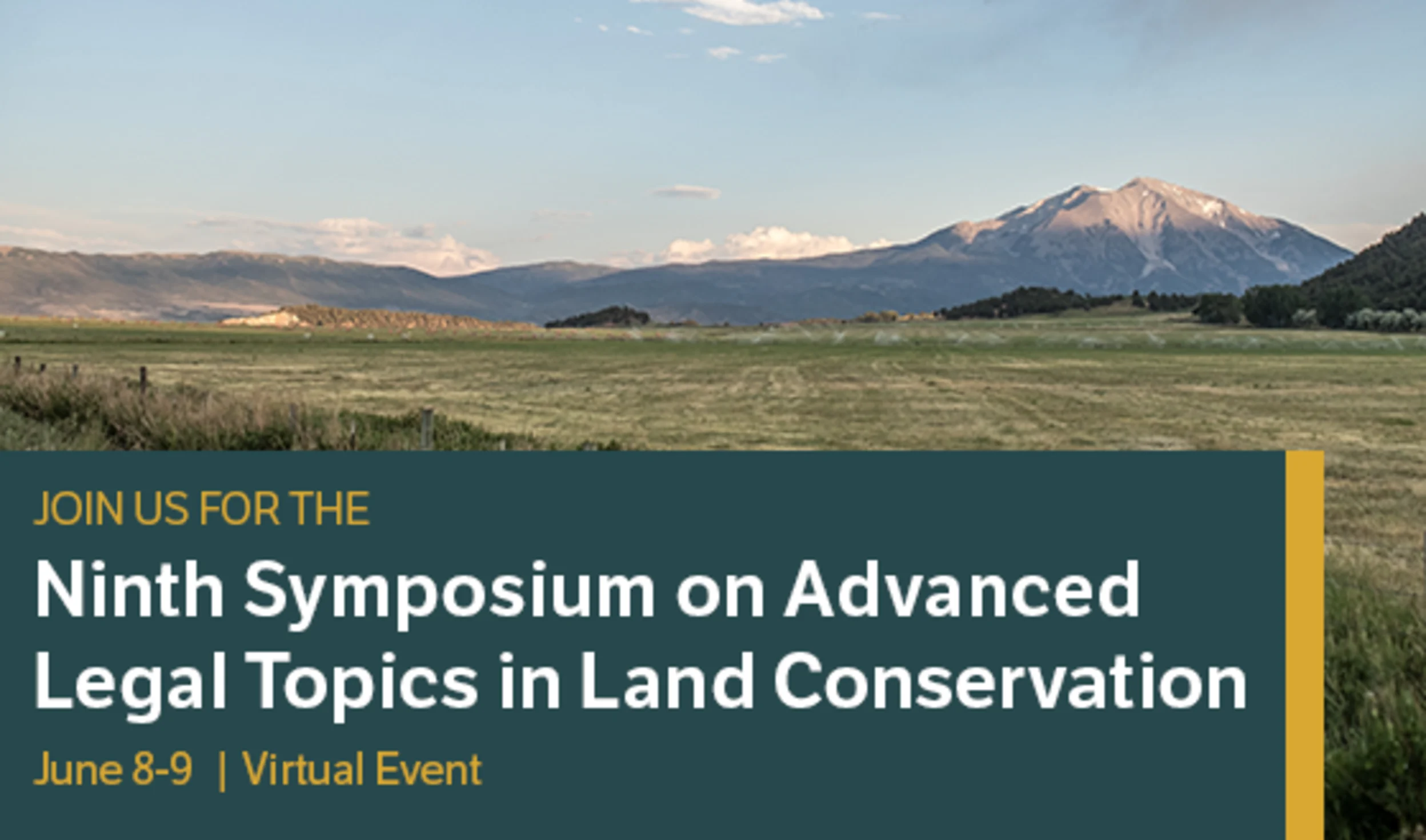
Event Date
Source
Location
Instructor
About This Event
You can now purchase the recordings of the 2023 Symposium on Advanced Legal Topics. After you complete your purchase to the right, you can come back to this page and find the recordings and materials from the event on this page below.
The Alliance cannot offer CLE certification to purchasers of the recordings but in some states, purchasers can seek self certification.
If you registered for the live event, log in to your account on the right to access the materials below as well.
Distinguished faculty delivered up-to-date information impossible to find at any other single program on timely topics in conservation law. You will leave with practical tips you can put to use immediately upon your return to the office.
During the sessions, we:
Identify strategies for collaborative conservation with public funders.
Delve into right of privacy issues in stewardship.
Review case law and strategies for timber trespass enforcement.
Discuss ethical and practice considerations for inside and outside counsel.
Examine strategies for climate adaptation and changing circumstances.
Look at recent precedent setting conservation cases.
Questions? Please email Ailla Wasstrom-Evans at awasstrom-evans@lta.org or call at 202.800.2249
Thank you to our Program Committee
Andy Dana | Conservation Law Associates
Melinda Ching | The Nature Conservancy (accredited)
Emily Parish | The Land Trust for Tennessee (accredited)
Steve Swartz | Humane Society Wildlife Land Trust (retired general counsel)
Leslie Ratley-Beach | Land Trust Alliance
Ailla Wasstrom–Evans | Land Trust Alliance
Agenda
Thursday, June 8, 1-5:50 p.m. Eastern
-
Welcome Remarks
- 1:05-2:35 p.m. (90 minutes)
Hot Cases in State and Federal Courts
Robert H. Levin, Conservation Attorney (ME)This session will kick off day one of the Symposium by delving deeply into a few leading cases with breaking developments in land conservation law. The session will provide up-to-date insight on the recent state cases and federal income tax cases. It will also address practitioner pointers, drafting considerations and stewardship implications of the cases dissected.
-
Break (10 minutes)
- 2:45-3:45 p.m. (60 minutes)
Right of Privacy Issues in Land Conservation Stewardship
Melinda Ching, senior attorney, Global Legal Team, The Nature Conservancy (HI); Tom Kay, executive director, Alachua Land Trust (FL)Remote still and video cameras are becoming common tools on conservation lands, used for a variety of purposes. Cameras mounted on land trust properties can monitor animal movement and presence, capture bird sounds, and identify weaknesses in perimeter security that may allow incursions by invasive species, livestock or humans. Captured imagery on preserves is also increasingly being used by land trusts for marketing and promotional purposes. While camera technology can supplement stewardship practices for staff, provide important data for research purposes, and increase outreach and awareness, land trusts must appropriately ensure that its practices adhere to state and federal privacy laws regarding capture and use of images of humans. This session will summarize the various ways in which remote camera technology is used for conservation, the legal issues that arise when using such technology and best practices to comply with the law and mitigate risks associated with capture of images and audio.
-
Break (10 minutes)
- 3:55-5:25 p.m. (90 minutes)
Collaborative Conservation with Public Funders
Bob Owen, General Counsel, Western Reserve Land Conservancy, (OH) Clint Miller, Regional Director, Central Midwest, The Conservation Fund (MN) Ginny Moore, Kansas State Director, The Conservation Fund (KS)Federal, state and local land conservation funding programs are growing. Community conservation is shifting land trust practices toward deeper collaborations with public partners. Yet, agencies and local governments sometimes impose unique requirements on land trusts to qualify for public conservation funds, leaving land trusts to puzzle over adapting both their conservation land and easement acquisition practices and their long-term stewardship of conservation properties to meet public partner expectations. At times, for example, public funder requirements may be difficult or impossible to reconcile with federal requirements for tax deductible conservation easements in conservation transactions involving bargain-sales. How much leeway is there to alter templates compliant with federal tax laws to meet public funding requirements? This session addresses multiple challenges associated with melding traditional private land conservation with diverse public conservation land and easement purchase programs. The goals of this session are to encourage land conservation practitioners, first, to recognize that land trusts may need to change their traditional practices and governance to adapt to new opportunities and new public partnerships and second, to encourage deliberate and strategic engagement in any such adaptation to ensure successful and durable collaborative conservation with public funders.
-
Break (Five minutes)
- 5:30-5:50 p.m. (20 minutes)
Optional Discussion
Not eligible for CLE credits
Friday, June 9, 12:30-5:30 p.m. Eastern
-
Welcome Remarks
- 12:35-2:05 p.m. (90 minutes)
Changing Circumstances: Legal Risk Analysis, Stewardship Administration and Enforcement
Misti Schmidt, Conservation Attorney, Conservation Partners LLP (CA); David Ray, Managing Director of Conservation, Low Country Land Trust (SC); Sydney Cook, General Counsel, Low Country Land Trust (SC)Land trusts across the country are grappling with changing circumstances that may not be contemplated in existing conservation easements or are being demanded now by landowners in new conservation easements. This session will discuss legal risk factors for evaluating requests and challenges as well as addressing increased demands on stewardship personnel. The presenters will discuss considerations when faced with an unexpected situation and how traditional stewardship tools- policies, interpretations, discretionary approvals, amendments, monitoring, management and community engagement—can be used and applied as our planet and communities that we serve continue to rapidly change.
-
Break (10 minutes)
- 2:15-3:45 p.m. (90 minutes)
Neighbors don’t always respect property lines, but don’t bet against a land trust
Ellen Kazary, Executive Director, Great Land Trust (AK); Jonathon Katcher, Conservation Attorney, Pope and Katcher (AK)Land trusts usually win when litigating severe violations of a conservation easement but obtaining necessary damages to fund restoration and pay all costs and fees, is more challenging. Timber trespass cases are especially challenging both to prove the case and obtain damages as they are difficult and expensive to document sufficiently to convince insurance companies to settle or if necessary to prevail at trial. Staff and boards are often tempted to settle instead of enduring years of litigation preparation, multiple motions, mediation, trial and appeal. But what is good enough for a land trust to settle a serious arboricide and land damage case? What are the tradeoffs in a major violation resolution? What can a land trust do proactively on to document evidence sufficient to prove timber trespass in your state? Does your land trust have good stewardship procedures and sound records? Is your board and staff ready to take an all-hands-on-deck approach to dispute resolution and the associated communication challenges? This session will evaluate litigation preparation and strategy issues in the context of a major arboricide and land damage case from Alaska.
-
Break (10 minutes)
- 3:55-4:55 p.m. (60 minutes)
Lawyers – Inside and Out: Different Roles Mean Different Responsibilities
Alice Jones, Land Trust Attorney Weinberg & Hromadka, PLLC (MT & WA); Ross Baxter, Land Projects Director, Iowa Natural Heritage Foundation (IA)Attorneys occupy many different roles in and for a land trust. As in-house counsel. As outside, retained counsel. As in-house counsel who work closely with outside counsel. As board members. As executive directors or other staff in non-legal positions. But both the lawyer and the land trust need to understand that their relationship can vary with each scenario. This session will address the professional, ethical, and practical considerations for the distinct roles an attorney may assume for the organization and explore answers to some frequently interrelated questions: Is there an attorney-client relationship? Who is the client? Who isn’t? Are communications legal advice? Are communications privileged and protected? What insurance applies, if any? What are the pros and cons – for lawyers and staff – of different models for providing legal services? Attendees will learn how to manage expectations while navigating these ethical boundaries in order to best protect the land trust’s interests.
-
Break (Five minutes)
- 5-5:30 p.m. (30 minutes)
Optional Discussion
Not eligible for CLE credits


Meet the faculty
-

Ross Baxter
Land Projects Director, Iowa Natural Heritage FoundationRoss is the Land Projects Director for Iowa Natural Heritage Foundation where he has worked since 2011. INHF is statewide land trust with 30 full-time staff involved in many facets of land protection. Ross primarily works on fee title acquisitions and is also involved with conservation easement review. As one of two attorneys on staff, he gets pulled into a myriad of discussions on various topics. When he is not scrambling with his wife to practices, scouts, and events for his three boys (10, 8 and 5) he does his best to enjoy some time outdoors hunting, biking, fishing and searching for a great prairie plant to photo.
-

Melinda Ching
Senior Attorney, The Nature ConservancyMelinda Ching is a Senior Attorney for The Nature Conservancy where she has provided legal counsel to a range of programs within The Nature Conservancy, including establishing offices in Australia and Mongolia and managing complex legal transactions such as debt for nature swaps in Indonesia. Her current practice includes providing all legal support for conservation programs in Hawaii, Palmyra Atoll, Arizona, Wyoming, Colorado and Idaho. Her current areas of focus are conservation easements and other conservation real estate transactions, lobbying and electioneering counsel and carbon projects. She has been with The Nature Conservancy since 2001. She is a graduate of the University of California, Berkeley and The King Hall School of Law, University of California, Davis. She is active in supporting diversity, equity and inclusion at the Conservancy and provides assistance to the Conservancy’s Employee Resource Groups as well as serves as a mentor for various internal mentoring cohorts and young legal professionals.
-
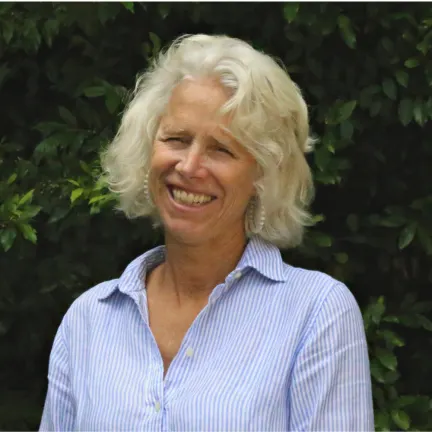
Sydney Cook
General Counsel, Lowcountry Land TrustSydney is an attorney with extensive leadership experience advising nonprofit organizations and national foundations on conservation policy, advocacy, and strategic matters. As General Counsel at Lowcountry Land Trust, ensures the permanence of protected lands, effectively working to resolve conservation easement compliance issues when applicable. Sydney has been general counsel for a DC-based organization focused on accountable US fisheries, trial attorney in the Natural Resources Division at the US Department of Justice and law clerk in the US District Court, District of Utah. Sydney holds a Bachelor of History from Colby College, a Master of Science in Environmental Studies from the University of Montana, and a Juris Doctor from the University of Utah.
-

Alice Jones
Partner, Weinberg & Hromadka, PLLCAlice’s professional passion is helping land trusts to conserve open spaces and ensure that conservation protections withstand the test of time. Alice has a deep respect for the land trust professionals, landowners, and communities that come together to solve complex challenges, protect natural places, and foster a sense of connection to the land.
Alice is a Partner with Weinberg & Hromadka, PLLC, a small law firm that specializes in real estate, land use, and conservation law. Alice’s practice focuses on serving land trusts in Montana and Washington State. Prior to joining Weinberg & Hromadka, Alice served for eight years as in-house counsel for Five Valleys Land Trust, a regional land trust based in Missoula, Montana, that works to protect agricultural land, water resources, wildlife habitat, and community open spaces. In that role, Alice collaborated closely with the land protection staff to draft, finalize, interpret, and enforce conservation easements and assist with fee land acquisitions, dispositions, and management.
Originally from Portland, Oregon, Alice earned a Bachelor of Arts in English Literature and Spanish at the University of Montana. After college, Alice spent a year as a Fulbright Scholar in Madrid teaching English at a public elementary school and taking classes in human rights law at a Spanish university. Alice earned her law degree at the University of Washington School of Law, where she focused on environmental and public interest law. Alice is on the Board of Directors of Homeword, an organization that works to create homes that people can afford and to provide homebuyer and financial education.
Alice enjoys spending time with family and friends and being in her favorite outdoor places – Missoula’s local trails, Montana’s endless backcountry, and the coasts and mountains of the Pacific Northwest.
-

Jonathon A. Katcher
civil litgatorJonathon is a semi-retired civil litigator and aspiring ski bum, with a B.B.S. from the University of Michigan, Ann Arbor, and a J.D. from the Lewis and Clark Law School, Portland Oregon. Starting in 1981 as an Assistant Public Defender in Anchorage, and moving into private practices in 1986, he has appeared in state and federal trial and appellate courts throughout the state of Alaska. His practice emphasis is complex civil litigation, and he also serves as a hearing officer, mediator, arbitrator and legal malpractice expert witness. He has been President of the Alaska Bar Association and is currently an attorney member of the Alaska Judicial Council which, as part of Alaska's merit based judicial selection system, nominates candidates to the governor to fill trial and appellate court vacancies. He has received the State of Alaska Attorney General's Pro Bono Service Award for his work on behalf of victims of domestic violence. He regularly bikes, hikes, kayaks and alpine skis (9 days during the 2021-22 ski season). Jonathon considers the Great Land Trust Eklutna River Estuary Conservation Easement case to be among the greatest accomplishments of his legal career. He lives in Anchorage with Kate Michaels, his spouse of 43 years.
-
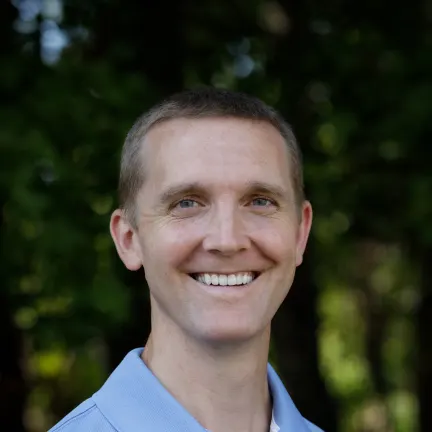
Tom Kay
Executive Director, Alachua Conservation TrustTom was named the Executive Director in June of 2013. He holds a bachelor’s of science degree in Environmental Policy & Behavior from the University of Michigan’s School of Natural Resources and Environment and a Juris Doctor from Florida State University’s College of Law.
A licensed Florida attorney, Tom has worked as a staff attorney for a large not-for-profit health care organization and a public housing authority. For seven years, he worked as a litigator in civil, criminal, and real estate matters. He has volunteered on local and national political campaigns and interned in U.S. Senator Bill Nelson’s Tallahassee office during law school. He serves on the Board of Directors as Chair of the Partnership for Gulf Coast Land Conservation, a coalition of more than two dozen local, regional and national conservation organizations that work to increase the pace, quality and permanence of voluntary land and water conservation within the five state Gulf Coast region. He also previously served as the President of the Alliance of Florida Land Trusts, the umbrella organization for state's 22 land trusts.
-

Ellen Kazary
Executive Director, Great Land TrustEllen joined Great Land Trust as the Executive Director in 2016 and is responsible for leading the organization to fulfill its mission to conserve and steward the lands and waters essential to the quality of life and economic health of Alaskans. Working in partnership with private and public landowners, GLT permanently protects the integrity of natural ecosystems, wetlands and streams, and public access to recreational lands throughout Southcentral Alaska.
Ellen has more than twenty years of experience in non-profit management and has specialized in financial management for stability and sustainability as well as leading efficient and productive teams to complete large-scale, complex projects in remote and urban areas of Alaska.
An avid outdoors person, Ellen was introduced to GLT when she and her partner, Chris, purchased a wetlands property from GLT. The protected property provides wildlife habitat near the cabin they built themselves. A passionate gardener, enthusiastic baker, and dog lover, Ellen can often be found on Alaska’s trails with Chris and their dogs, Tucker and Finley. Year-round, Ellen enjoys her daily 20-mile roundtrip bike commute to the GLT office, where she works with the outstanding staff, dedicated board, and dozens of diverse partners to meet GLT’s mission.
-
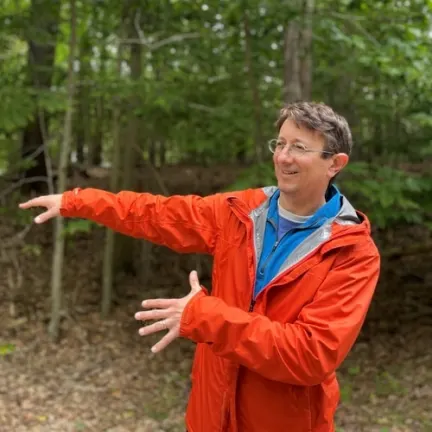
Rob Levin
Attorney at LawRob runs a solo law practice specializing in land conservation and nonprofit organizations. He has extensive experience in land conservation transactions and related tax matters. Since 2003, Rob has consulted frequently for the Land Trust Alliance, including researching case law, drafting amicus briefs, and keeping track of conservation easement enabling statutes. He also represents dozens of Maine and New Hampshire land trusts. Rob has spoken at many conferences, including the Land Trust Alliance Rally and the Maine Land Trust Conference, and has written several papers on conservation issues in Tax Notes, the Land Trust Alliance’s Exchange, and NYU’s Environmental Law Journal.
Rob graduated from Haverford College in 1996 and from New York University Law School in 2001. After law school, he served for one year as a judicial clerk in the United States District Court for the District of Columbia.
When he’s not in the office, Rob is recalling the words of E.B. White, trying to decide whether to save or savor the world on any given day. You might find him planning a climate disobedience action. Or biking across the country with his family. Or volunteering at his local Quaker Meeting. Or listening to the latest Sox game while woodworking or playing the piano.
-
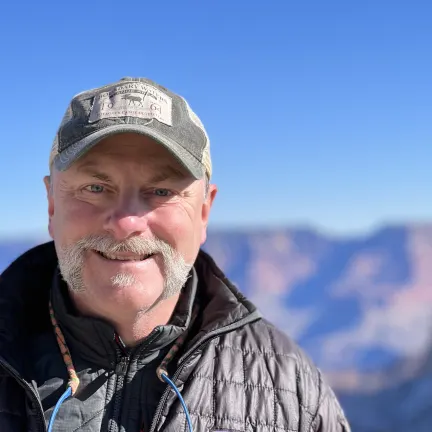
Clint Miller
Central Midwest Regional Director, The Conservation FundClint joined The Conservation Fund in 2008 and serves as the Central Midwest Regional Director. In his regional capacity he oversees the Fund’s work in Nebraska, Missouri, Iowa and Kansas was well as working in Wisconsin, Michigan, North and South Dakota. Clint is a seasoned conservation professional who has worked since 1988 in land conservation and wildlife management from Alaska and Florida to the Great Plains. He is the Fund’s lead on implementation of the Midwest Habitat Mitigation Project, a $22 million compensatory mitigation program for a 600-mile oil pipeline running across four states. He is a recognized expert negotiator and facilitator, working with federal, state and local agencies, corporations and families on complex real estate transactions, conservation easements, mitigation, public and private funding and finance. Clint serves as a commissioner on the Land Trust Accreditation Commission and on Gathering Waters Conservancy’s Land Trust Council in Wisconsin. He previously worked as a regional director for the Minnesota Land Trust and led a community-based conservation program for The Nature Conservancy in the Dakotas after spending 12 years as a wildlife biologist and land manager. In his spare time Clint enjoys traveling in domestically and abroad, hiking and exploring new places, and spending time with wife and adult children. He is a former structural and wildland firefighter and spent 15 years as an EMT.
-

Ginny Moore
Kansas State Director, The Conservation FundGinny joined The Conservation Fund in 2016, bringing to the Fund and its partners more than 20 years of expertise in natural resource protection and open space preservation. She leads the Fund’s conservation efforts in Kansas, providing local, state and national partners with the Fund’s full array of conservation programs and initiatives. She also manages significant conservation projects in Missouri and Oklahoma. Prior to joining the Fund, Ginny served as Executive Director of the Kansas Land Trust, counseled clients on complex environmental, natural resource and real estate matters while in private law practice and served as Assistant Regional Counsel for EPA Region 7. She is an alum of the Land Trust Alliance’s Conservation Defense Advisory Council, is Co-Chair of the Missouri Land Trust Coalition and is active in climate mitigation planning in the Kansas City metro. Ginny finds solace spending time with her family hiking and skiing the magnificent mountains of New Mexico.
Ginny holds a B.A. from the University of Iowa and a J.D. with distinction from the University of Iowa College of Law. She is a member in good standing of The Missouri Bar.
-

Bob Owen
General Counsel, Western Reserve Land ConservancyBob Owen has served as General Counsel for Western Reserve Land Conservancy since September 2011 and has been a member of the Land Conservancy’s legal staff since April 2006. During his time at the Land Conservancy, Bob has worked on over 400conservation real estate transactions ranging in scope from straight forward individual conservation easement donations to complex, multi-million dollar acquisitions involving public and private sector parties and often combining state and federal grant funding with private philanthropic dollars. As General Counsel, Bob is responsible for the oversight and management of the Land Conservancy’s in-house legal department and provides guidance and counsel to the Land Conservancy’s leadership and staff on legal matters affecting the organization, such as violation resolution, litigation management, corporate governance, insurance, employment practices, and other matters involving risk management and avoidance. Bob’s leadership as a member of the Land Conservancy’s Land Trust Accreditation Team lead to the organization’s successful bid for accreditation from the Land Trust Accreditation Commission in August of 2019. Bob is a member of the Land Conservancy’s senior management team and serves as the organization’s Assistant Secretary. In addition to his extensive experience in conservation, real property, and non-profit law, as an associate in the Cleveland, Ohio office of Taft, Stettinius and Hollister, Bob focused much of his practice in the areas of real estate and municipal law, leading him to serve a local northeast Ohio community as both its assistant law director and prosecutor for over six years. As such, Bob is well versed in matters involving municipal and public sector clients. Bob currently serves as a Member of the Terrafirma Risk Retention Group Members Committee, representing the Great Lakes Region; previously, he served as a member of the Land Trust Alliance’s Conservation Defense Advisory Council (CDAC)from 2014-2018. Furthermore, Bob served as a member of the executive committee of the Coalition of Ohio Land Trusts (COLT), a state-wide land conservation advocacy and education group, from 2007-2014 and served as its President from 2012-2014. He is a graduate of the Cleveland-Marshall College of Law and obtained his Bachelor’s degree in Business Administration from Hiram College. Bob is a lifelong resident of northeastern Ohio and currently lives in Newbury Township, Ohio with his wife Gina and his beloved dog Jackson.
-

David Ray
Chief Conservation Officer, Lowcountry Land Trust’sDavid Ray is Lowcountry Land Trust’s Chief Conservation Officer. His team protects land and water in South Carolina’s coastal plain using traditional and innovative tools and funding; stewards a wide variety of conservation interests; and works with communities to preserve places of natural resource, recreational, and cultural significance. Previously an attorney in government, large firm and academic settings, he became Lands Program Director for the Southern Appalachian Highlands Conservancy in 2002. Subsequently, he managed conservation planning and grant-making programs at the Open Space Institute, and has led conservation programs for The Nature Conservancy in the Southern Blue Ridge and Colorado. David holds degrees from Davidson College and the University of Georgia School of Law. During his career he has played a significant role in over fifty conservation projects on more than 40,000 acres.
-
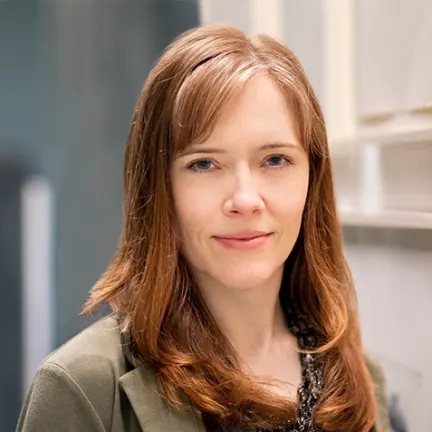
Misti Schmidt
Attorney Partner, Conservation Partners LLPMisti Schmidt is an attorney partner at Conservation Partners LLP in Oakland, California, where she focuses her practice on the real estate and tax aspects of conservation transactions, including donative and mitigation conservation easements and carbon projects, as well as tax-exempt organization governance. Misti received her Master of Laws in Taxation from New York University School of Law and her juris doctorate from the University of California, Berkeley School of Law, where she received a Certificate in Environmental Law.
CLE Credit
For attorneys seeking CLE credit, verification of attendance is necessary for CLE reporting. During each presentation, a secret word will be posted in the powerpoint and chat which attorneys will need to record and submit after the Symposium as proof of attendance.
Important details
Please note that some sessions will be pre-recorded and others will be live. . Participants will be able to communicate during the presentation via text chat which will be moderated. Upon the completion of the recording, the presenters will be fielding questions from the audience. To ask a question, simply post it in chat or click on “raise hand” and the moderator will put you in a queue. Please note that the Symposium, including your name and any comments written or verbal, will be recorded and shared with participants and others who purchase the recording.
Cancellation policy
The Alliance will not be offering refunds for this virtual event. All sales are final and will be non-transferable to any other Land Trust Alliance offerings or events. If you wish to add to your registration or transfer to a different person, please submit a request to registration@lta.org.
Contact us
Please note the Land Trust Alliance office hours are 9 a.m. to 5 p.m. Eastern.
Louisa Gibson
For registration questions, please email Louisa Gibson or call 202-800-2225
Ailla Wasstrom-Evans
For course content questions, please email Ailla Wasstrom-Evans or call 202-800-2249.
Scott Yaw
For questions on CLE credit, please email Scott Yaw or call 202-800-2248.
Explore related resources

Practical Pointers for Land Trusts When Facing a Lawsuit or Other Legal Challenge of Any Size
This toolbox will help you build skills so that you are prepared to operate calmly, confidently, efficiently and effectively in the face of legal challenges. Although this toolbox focuses primarily on the challenges of defending conservation easements, the litigation issues and strategies are applicable to fee-owned lands.